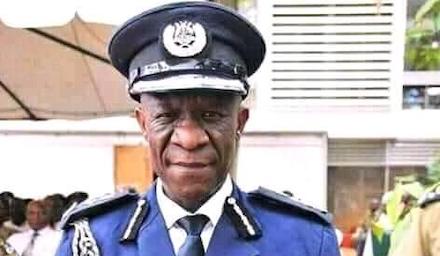Police chief Okoth. Photo: Facebook.
There must be accountability at some point.
The U.S., which supports Uganda with $1 billion annually in financial aid and military support has indicated there will be sanctions against army commanders involved in human rights abuses as well as officials standing in the way of free election on Jan. 14, 2021.
Yet, dictator Yoweri Museveni’s regime is promising to use more deadly methods on Ugandans who would be recalcitrant against Electoral Commission rules illegally protracted to help in this election period because of coronavirus pandemic. Based on Uganda’s history of election violence, many see another scheme for Museveni to steal the election, for the 6th time.
There is every indication the regime plans to rig and then deal with protestors, judging by comments by heads of the relevant institutions.
The police have unleashed an open attack against journalist, brutally beating some and even shooting others, especially those trailing presidential candidate Robert Kyagulanyi’s (a.k.a Bobi Wine) and Patrick Oboi Amuriat’s campaigns. Many journalists have also had their equipment confiscated or destroyed.
“I would like to assure the whole country that whoever causes trouble will regret why his or her mother gave birth to him or her,” the Inspector General of Police, Ochola Martin Okoth, said.
Of course, such threats are aimed at curtailing opposition activists from coming out and voting in large numbers than staying at polling locations to protect their votes to prevent rigging.
The police chief, Okoth, then made a statement to journalists—justifying their brutalization—that should land him on the docks at the International Criminal Court (ICC) if the mayhem escalates. “We have received complaints that the security is targeting the media,” he said. “On the contrary, it is the media targeting security. It portrays security as brutal and siding with the government. When we tell a journalist that do not go there and you insist on going where there is danger, we shall beat you for your own safety and there is no apology.”
Inappropriate threats from the national police commander considering that in November unarmed civilians who protested the arrest of candidate Robert Kyagulanyi, a.k.a. Bobi Wine, were mowed down. Estimates of those killed range from 54 to more than 100.
“There is always an upsurge of the prison population especially after the elections. I can assure you that we can accommodate whatever number of people are or will be thrown at us after the election,” said Dr. Johnson Byabashaija, the head of Uganda Prisons.
There is absolutely no law that prevents voters from carrying their mobile phones to the polling stations to capture a screenshot after they vote. Yet, Simon Byabaka head of the Museveni hand-picked Electoral Commission claims this won’t be allowed. The Electoral Commission wants people to go home and wait for the results after voting—voters won’t be allowed to witness vote counting, and polling agents of all candidates must access venues with coronavirus free certificates.
“Tell Mr. Byabakama that the world is watching him descend into criminality,” Bobi Wine, a leading presidential candidate, representing the National Unity Platform (NUP) party, said. “He is the head of the electoral commission that is supposed to be independent so there is no way he should stop or stand in the way of transparency. There is no law that forbids people from capturing what is happening on election day most especially journalists.”
“We task the electoral commission to cite the law which forbids use of cameras and phones at the polling station,” Patrick Oboi Amuriat, a presidential candidate representing the Forum for Democratic Change (FDC) party said, in reaction. “We have also received information that you want all persons going to witness election processes to have undergone coronavirus tests with a certificate showing negative. This however, requires resources which are not available.”
“A voter who has cast their vote that will determine their welfare for the next five years wants to stay around and protect it yet you are telling them to go away, and go where?” Mugisha Muntu, retired general and presidential candidate under the Alliance for National Transformation (ANT), said.
Meanwhile, Nobert Mao, presidential candidate under the Democratic Party (DP) ticket, said: “I have heard the chairperson of EC, Justice Simon Byabakama, banning photography at the polling station and witnessing ballot counting after elections, but there is no legal basis. The chairman electoral commission is acting outside the confines of the law and citizens should ignore him.”
Uganda wouldn’t be at this volatile and combustible crossroads had dictator Museveni not emasculated the constitution. He first forced Parliament to remove the two presidential terms limit, then the 75 years old ceiling for all candidates. Here he is now, in his old age, doing everything possible to consolidate power until he breathes his last.
Columnist Kakwenza Rukirabashaija can be reached via kakwenzarukirabashaija@gmail.com







